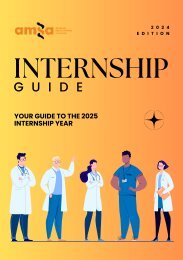AJGH Nexus - Volume 17 2023
AMSA Journal of Global Health (AJGH) 2023 Issue "Nexus"
AMSA Journal of Global Health (AJGH) 2023 Issue "Nexus"
You also want an ePaper? Increase the reach of your titles
YUMPU automatically turns print PDFs into web optimized ePapers that Google loves.
What worried us most?<br />
Identifying and measuring<br />
common concerns about the<br />
impact of the COVID-19 pandemic<br />
<strong>Volume</strong> <strong>17</strong> | <strong>2023</strong><br />
Abstract<br />
Aim<br />
This study aimed to determine what a cohort of<br />
Australian adults were worried about at an early<br />
stage of the COVID-19 pandemic. Perception of<br />
risk and worry are known to influence the<br />
uptake of health protecting behaviours and<br />
therefore understanding patterns of worry can<br />
impact the design of public health campaigns.<br />
Methods<br />
We retrospectively analysed data obtained from<br />
a cross-sectional online survey of working adults<br />
residing in Australia. Worry about COVID-19 was<br />
measured using a COVD-19 Worry Scale<br />
consisting of 15 questions and variations of<br />
which have been used in studies elsewhere in<br />
Australia and internationally. Statistical analysis<br />
compared level of worry between different<br />
demographic groups and identified predictors of<br />
total score on the COVID-19 Worry Scale.<br />
Results<br />
There were 494 respondents to the COVID-19<br />
Worry Scale. Of the 15 questions, the 5 most<br />
associated with the highest level of worry were<br />
“my loved ones’ health”, “economic recession in<br />
my country”, “health system being<br />
overwhelmed”, “small companies running out of<br />
business” and “losing someone I love”. Higher<br />
total worry score was significantly associated<br />
with higher total score on a 21-item Depression<br />
Anxiety and Stress Scale (DASS21), work being<br />
impacted by COVID-19 and female sex.<br />
Conclusion<br />
Our results suggest that people have diverse<br />
worries about COVID-19 but concern for the<br />
health of loved ones and the economy are<br />
consistently ranked highly and therefore these<br />
factors should be considered in designing<br />
interventions to slow transmission of the virus.<br />
Keywords<br />
COVID-19, pandemic, worry, fear, public health,<br />
mental health, anxiety<br />
1. Introduction<br />
1.1 The pandemic’s impact on daily life<br />
in Australia<br />
The COVID-19 pandemic has had a significant<br />
social, economic and psychological impact<br />
globally.[1] At the time of writing, there have<br />
been almost 238 million cases of coronavirus<br />
recorded worldwide and close to 4.8 million<br />
people have died from the infection.[2]<br />
Public health restrictions to control the spread<br />
have impacted Australians since the first case of<br />
local community transmission in March 2020.[3]<br />
To prevent intensive care units being<br />
overwhelmed, federal and state governments<br />
introduced a range of measures including travel<br />
restrictions, social distancing measures, closing<br />
of non-essential businesses and limiting the<br />
number of people at indoor gatherings.[4]<br />
1.2 Measuring worry about COVID-19<br />
and implications<br />
As a “once in a century” event,[5] relatively little<br />
is known about peoples’ responses to such a<br />
global health crisis. By way of trying to overcome<br />
this gap in knowledge, the World Health<br />
Organisation (WHO) has released guidelines on<br />
studying behaviour and perceptions of the<br />
pandemic to promote research into the area.[6]<br />
It has been recognised that understanding<br />
peoples’ perceptions and responses to the<br />
pandemic is relevant to designing effective<br />
public health campaigns to slow transmission of<br />
the virus as risk perception is known to drive<br />
such health protecting behaviours.[7, 8] Public<br />
02

















